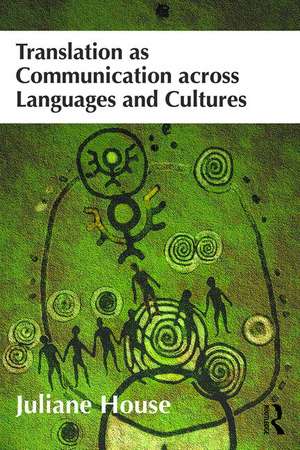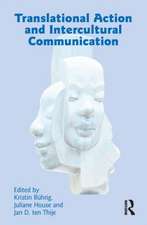Translation as Communication across Languages and Cultures
Autor Juliane Houseen Limba Engleză Paperback – 5 noi 2015
Featuring an account of translation from a linguistic-cognitive perspective, House covers problematic issues such as the existence of universals of translation, cases of untranslatability and ways and means of assessing the quality of a translation. Recent methodological and research avenues such as the role of corpora in translation and the effects of globalization processes on translation are presented in a neutral, non-biased manner. The book concludes with a thorough, historical account of the role of translation in foreign language learning and teaching and a discussion of new challenges and problems of the professional practice of translation in our world today.
Written by a highly experienced teacher and researcher in the field, Translation as Communication across Languages and Cultures is an essential resource for students and researchers of Translation Studies, Applied Linguistics and Communication Studies.
| Toate formatele și edițiile | Preț | Express |
|---|---|---|
| Paperback (1) | 347.62 lei 6-8 săpt. | |
| Taylor & Francis – 5 noi 2015 | 347.62 lei 6-8 săpt. | |
| Hardback (1) | 999.02 lei 6-8 săpt. | |
| Taylor & Francis – 16 noi 2015 | 999.02 lei 6-8 săpt. |
Preț: 347.62 lei
Nou
Puncte Express: 521
Preț estimativ în valută:
66.52€ • 69.64$ • 55.04£
66.52€ • 69.64$ • 55.04£
Carte tipărită la comandă
Livrare economică 05-19 aprilie
Preluare comenzi: 021 569.72.76
Specificații
ISBN-13: 9781408289839
ISBN-10: 1408289830
Pagini: 168
Ilustrații: illustrations
Dimensiuni: 156 x 234 x 9 mm
Greutate: 0.25 kg
Ediția:1
Editura: Taylor & Francis
Colecția Routledge
Locul publicării:Oxford, United Kingdom
ISBN-10: 1408289830
Pagini: 168
Ilustrații: illustrations
Dimensiuni: 156 x 234 x 9 mm
Greutate: 0.25 kg
Ediția:1
Editura: Taylor & Francis
Colecția Routledge
Locul publicării:Oxford, United Kingdom
Public țintă
Postgraduate and UndergraduateCuprins
List of Figures
List of Tables
Acknowledgements
Introduction
Part I: Central Concepts
Chapter 1: The Nature of Translation as Part of Applied Linguistics
Chapter 2: Overview of Different Approaches to Translation
Chapter 3: Some New Trends in Translation Studies
Chapter 4: Culture and Translation
Part II: Translatability, Universals, Text, Context and Translation Evaluation
Chapter 5: From Untranslatability to Translatability
Chapter 6: Universals of Translation?
Chapter 7: Text and Context: A functional-pragmatic view
Chapter 8: Translation Quality Assessment: Review of Approaches and Practices
Part III: Some New Research Avenues in Translation Studies
Chapter 9: Translation and Bilingual Cognition
Chapter 10: The Role of Corpora in Translation Studies
Chapter 11: Globalization and Translation
Part IV: Translation Practice in Different Societal Domains
Chapter 12: Translation and Foreign Language Learning and Teaching
Chapter 13: The Professional Practice of Translators: New Challenges and Problems
Bibliography
List of Tables
Acknowledgements
Introduction
Part I: Central Concepts
Chapter 1: The Nature of Translation as Part of Applied Linguistics
Chapter 2: Overview of Different Approaches to Translation
Chapter 3: Some New Trends in Translation Studies
Chapter 4: Culture and Translation
Part II: Translatability, Universals, Text, Context and Translation Evaluation
Chapter 5: From Untranslatability to Translatability
Chapter 6: Universals of Translation?
Chapter 7: Text and Context: A functional-pragmatic view
Chapter 8: Translation Quality Assessment: Review of Approaches and Practices
Part III: Some New Research Avenues in Translation Studies
Chapter 9: Translation and Bilingual Cognition
Chapter 10: The Role of Corpora in Translation Studies
Chapter 11: Globalization and Translation
Part IV: Translation Practice in Different Societal Domains
Chapter 12: Translation and Foreign Language Learning and Teaching
Chapter 13: The Professional Practice of Translators: New Challenges and Problems
Bibliography
Recenzii
‘Juliane House’s book is an incisive re-evaluation of the position of Translation Studies and its relation to Applied Linguistics. It brings together a wealth of critical material to provide a wide-ranging, up-to-date assessment of the complex phenomenon of translation in its broader linguistic, cognitive and social contexts.’ Jeremy Munday, University of Leeds, UK
'This is an important book for researchers and practitioners in applied linguistics – a passionate plea to consider translation as recontextualization and cross-cultural communication. Thoroughly researched with plenty of examples, this book also makes a forceful argument for rehabilitating translation in foreign language learning and teaching.’ Claire Kramsch, University of California, Berkeley, USA
“Juliane House’s book is an incisive re-evaluation of the position of Translation Studies and its relation to Applied Linguistics. It brings together a wealth of critical material to provide a wide-ranging, up-to-date assessment of the complex phenomenon of translation in its broader linguistic, cognitive and social contexts.” Jeremy Munday, University of Leeds, UK
“This is an important book for researchers and practitioners in applied linguistics - a passionate plea to consider translation as recontextualization and cross-cultural communication. Thoroughly researched with plenty of examples, this book also makes a forceful argument for rehabilitating translation in foreign language learning and teaching.” Claire Kramsch, University of California, Berkeley, USA
"To be highly recommended on at least three reasons: (i) a wide coverage, (ii) an up-to-date discussion and (iii) a combination of insightful theoretical analysis with empirical research."
Yuanyi Ma, Guangdong Polytechnic of Science and Technology
Bo Wang, Sun Yat-sen University
'This is an important book for researchers and practitioners in applied linguistics – a passionate plea to consider translation as recontextualization and cross-cultural communication. Thoroughly researched with plenty of examples, this book also makes a forceful argument for rehabilitating translation in foreign language learning and teaching.’ Claire Kramsch, University of California, Berkeley, USA
“Juliane House’s book is an incisive re-evaluation of the position of Translation Studies and its relation to Applied Linguistics. It brings together a wealth of critical material to provide a wide-ranging, up-to-date assessment of the complex phenomenon of translation in its broader linguistic, cognitive and social contexts.” Jeremy Munday, University of Leeds, UK
“This is an important book for researchers and practitioners in applied linguistics - a passionate plea to consider translation as recontextualization and cross-cultural communication. Thoroughly researched with plenty of examples, this book also makes a forceful argument for rehabilitating translation in foreign language learning and teaching.” Claire Kramsch, University of California, Berkeley, USA
"To be highly recommended on at least three reasons: (i) a wide coverage, (ii) an up-to-date discussion and (iii) a combination of insightful theoretical analysis with empirical research."
Yuanyi Ma, Guangdong Polytechnic of Science and Technology
Bo Wang, Sun Yat-sen University
Notă biografică
Juliane House is Emeritus Professor, Hamburg University, Distinguished Professor at Hellenic American University, Athens and President of the International Association for Translation and Intercultural Studies. Her key titles include Translation Quality Assessment: A Model Revisited (1997), Translation (2009), Translational Action and Intercultural Communication (2009), Translation: A Multidisciplinary Approach (2014) and Translation Quality Assessment: Past and Present (Routledge, 2014).
Descriere
In this interdisciplinary book, Juliane House breaks new ground by situating translation within Applied Linguistics. In thirteen chapters, she examines translation as a means of communication across different languages and cultures, provides a critical overview of different approaches to translation, of the link between culture and translation, and between views of context and text in translation.
Featuring an account of translation from a linguistic-cognitive perspective, House covers problematic issues such as the existence of universals of translation, cases of untranslatability and ways and means of assessing the quality of a translation. Recent methodological and research avenues such as the role of corpora in translation and the effects of globalization processes on translation are presented in a neutral, non-biased manner. The book concludes with a thorough, historical account of the role of translation in Foreign Language Learning and Teaching and a discussion of new challenges and problems of the professional practice of translation in our world today.
Written by a highly experienced teacher and researcher in the field, Translation as Communication across Languages and Cultures is an essential resource for students and researchers of translation studies, applied linguistics and communication studies.
Featuring an account of translation from a linguistic-cognitive perspective, House covers problematic issues such as the existence of universals of translation, cases of untranslatability and ways and means of assessing the quality of a translation. Recent methodological and research avenues such as the role of corpora in translation and the effects of globalization processes on translation are presented in a neutral, non-biased manner. The book concludes with a thorough, historical account of the role of translation in Foreign Language Learning and Teaching and a discussion of new challenges and problems of the professional practice of translation in our world today.
Written by a highly experienced teacher and researcher in the field, Translation as Communication across Languages and Cultures is an essential resource for students and researchers of translation studies, applied linguistics and communication studies.

